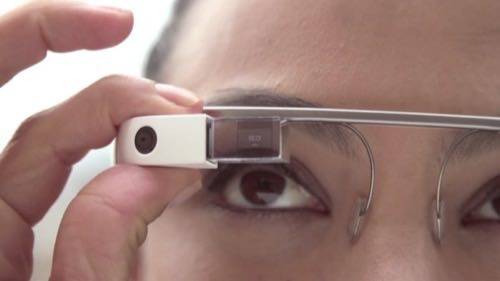
Depending on who you ask, wearable computers will either be the next big thing in technology or a completely superfluous and socially unacceptable line of gadgets only for pretentious techno-nerds. Mark Johnson wants you to know he’s in the former group, at least where Google Glass is concerned.
Johnson is the CEO of Zite, a personalized mobile news app that’s making the transition to Google Glass. The new Glass app, which it’s announcing today, will deliver the top 10 stories in a user’s Zite app straight to the screen hanging in front of her face. The app will also be able to read news stories aloud. Zite follows other publishers such as the New York Times, Twitter and Facebook, all of whom have already released Glass apps.
Why Zite Won’t Pass On Glass
The question plaguing many developers where Google Glass is concerned is simple: Why? Why spend time and resources building an app for a device that only a few thousand extremely select people currently use, and which has no guarantee of ever being a mass-market hit like smartphones and tablets?
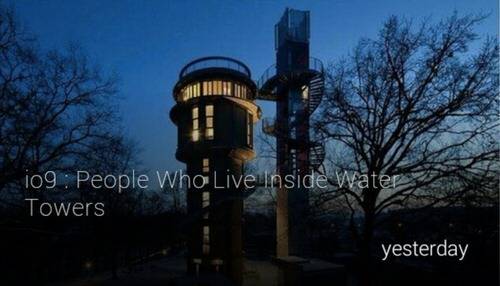
Google hasn’t announced a public launch date for Glass, and rumors of the spectacles coming in 2014 at a budget-friendly price of $299 appear to be unfounded. Google’s moonshot is a cool idea, but it’s still just a beta product wrapped within a beta product. So why bother?
Johnson cites two reasons: The fear of missing out, and the ability to build for some cool technology that has the potential to be huge.
“When I got this pair of Glass I was really honored to be in the program but I thought, honestly, is that it is just a gimmick,” Johnson told ReadWrite. “As I started using them I realized that a revolution is coming, a revolution that is going to be pretty impossible for people to ignore. Not just for we that develop applications, but for consumers as well.”
As Game Changing As The Web Itself
Johnson likens Google Glass to the first time he saw the World Wide Web on a Mosaic browser, the now-ancient (in Internet time) ancestor of modern browsers.
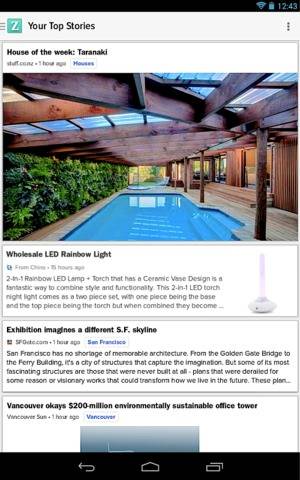
“I remember that moment in my life and was like, holy shit, there is something here, there is a revolution coming,” Johnson said. “I actually felt the same way when I put on my Google Glass for the first time and forced myself to use it. I thought, wow, there is something here that is going to be hard to explain to people what is coming.”
Zite the company actually started as a semantic search engine called Worio, but changed course in 2011 to focus on news with a mobile-only focus. Its new app launched in the early days of the iPad and has expanded to the iPhone, Android smartphones and Windows Phone. Google Glass is a natural extension of that approach—albeit one heavily influenced by Johnson’s belief that Glass is just really cool.
The other reason to develop for Glass—the fear of missing out—also plays a factor. Internet disruption caught the media industry unprepared. With mobile now ascendant, media companies don’t want to miss the boat again. If that means building for platforms that ultimately may have no meaningful consumer adoption, so be it. It’s better to cover the bases early than be the company that has to catch up to everyone else.
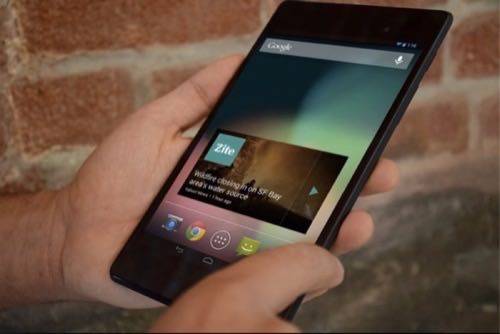
“I really want to be in early on that,” Johnson said. “I think it is important for us to be experimenting on these platforms which are going to be critical for people getting their news and information. And I want to make sure that as this revolution comes about, we are going to understand what consumers want and are going to be prepared for when Google Glass and other kinds of wearables like watches and whatnot become mainstream.”
Zite 2.0 Comes To Android
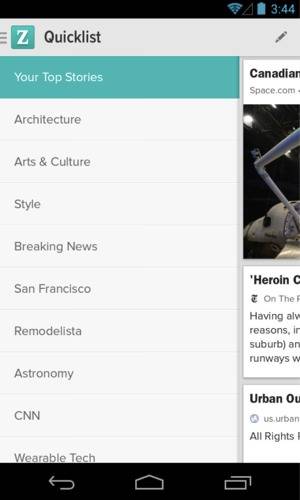
Johnson is a big proponent of making Zite shine on each mobile operating system. The app started on the iPad but has expanded down the line to Android and Windows Phone. Johnson is the type of mobile nerd who sees something great in each of the platforms. As such, he wants to see Zite shine on each operating system.
Zite also announced today that version 2.0 of its app is coming to Android. Zite 2.0 was first shipped to the iPad in December 2012 and since then the company has been working to build the next generation of Zite for Android based on its iOS redesign. Instead of a straight port from the iPad app to Android, Johnson said that the Zite team wanted to make sure the app was very “Android-y” while still retaining the magazine feel that people like on iOS.
“Before we got Zite completely working on Android, looking at some of our competitors you notice that they really have just taken the iOS version and ported it over to Android. I really wanted to avoid that, I really wanted to take advantage of all the great features that Android has to offer,” Johnson said.
Zite will offer a dynamic widget for device home screens, an Android-style quick list, better personalization of news content and even integration with Samsung’s S Pen stylus on Galaxy Note devices.
Johnson said that Zite will also have a fully functional refresh of the app for iOS 7 when it is released to the public sometime in September.

















